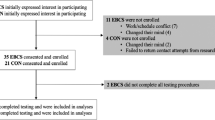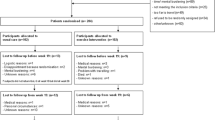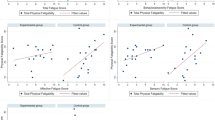Abstract
Background
Among breast cancer populations, exercise interventions resulted in positive but relatively small improvements on fatigue, which may be due to insensitive measures of global fatigue. Perceived fatigability—whole-body tiredness anchored to standardized tasks/activities of a specific intensity and duration—may help to detect effective exercise interventions reducing fatigue in oncology. We examined whether perceived physical fatigability improved after an exercise intervention.
Methods
This single center randomized clinical trial of 49 breast cancer survivors was conducted from 2015 to 2017, among which 41 participants (22 = exercise, 19 = control) completed the trial and reported their perceived physical fatigability at the first (Visit 1) and the last visit (Visit 3) over 6–14 weeks. Perceived physical fatigability was measured using the 10-item, self-administered Pittsburgh Fatigability Scale (PFS) scored 0–50. The mean differences of perceived physical fatigability between Visit 3 and Visit 1 were computed and compared by intervention groups using two sample t test.
Results
Among the 41 women in the study (mean age 54.9 ± 9.8 years; 80% white), sociodemographic, clinical characteristics and baseline fatigue level were similar by intervention groups, except for antiestrogen use. Post-intervention changes (mean ∆ ± SE) of PFS Physical scores were greater in the exercise group (− 4.4 ± 1.4; − 22.5%) than the control group (0.2 ± 1.4; + 1.0%) (p = .022).
Conclusion
The PFS captured a reduction in fatigue after the exercise intervention among breast cancer survivors. These findings aid mounting efforts to reduce fatigue in oncology by introducing a more sensitive instrument to measure perceived physical fatigability to better evaluate patient-reported outcomes in future cancer trials.
Trial registration
Clinicaltrials.gov identifier: NCT 02770781



Similar content being viewed by others
References
Bower JE, Ganz PA, Desmond KA, Rowland JH, Meyerowitz BE, Belin TR. Fatigue in breast cancer survivors: occurrence, correlates, and impact on quality of life. J Clin Oncol. 2000;18:743–53.
Dow KH, Ferrell BR, Leigh S, Ly J, Gulasekaram P. An evaluation of the quality of life among long-term survivors of breast cancer. Breast Cancer Res Treat. 1996;39:261–73.
Kim SH, Son BH, Hwang SY, Han W, Yang J-H, Lee S, et al. Fatigue and depression in disease-free breast cancer survivors: prevalence, correlates, and association with quality of life. J Pain Symptom Manage. 2008;35:644–55.
Jacobsen PB, Stein K. Is fatigue a long-term side effect of breast cancer treatment? Cancer Control. 1999;6:256–63.
Bower JE, Bak K, Berger A, Breitbart W, Escalante CP, Ganz PA, et al. Screening, assessment, and management of fatigue in adult survivors of cancer: an American Society of Clinical oncology clinical practice guideline adaptation. J Clin Oncol. 2014;32:1840–50.
Alexander NB, Taffet GE, Horne FM, Eldadah BA, Ferrucci L, Nayfield S, et al. Bedside-to-Bench conference: research agenda for idiopathic fatigue and aging. J Am Geriatr Soc. 2010;58:967–75.
Cramp F, Daniel J. Exercise for the management of cancer-related fatigue in adults. Cochrane Database Syst Rev. 2008;11:CD006145.
Furmaniak AC, Menig M, Markes MH. Exercise for women receiving adjuvant therapy for breast cancer. Cochrane Database Syst Rev. 2016;9:CD005001.
Ehlers DK, DuBois K, Salerno EA. The effects of exercise on cancer-related fatigue in breast cancer patients during primary treatment: a meta-analysis and systematic review. Expert Rev Anticancer Ther. 2020;20:865–77.
Campbell KL, Winters-Stone KM, Wiskemann J, May AM, Schwartz AL, Courneya KS, et al. Exercise guidelines for cancer survivors: consensus statement from international multidisciplinary roundtable. Med Sci Sports Exerc. 2019;51:2375–90.
Brown JC, Huedo-Medina TB, Pescatello LS, Pescatello SM, Ferrer RA, Johnson BT. Efficacy of exercise interventions in modulating cancer-related fatigue among adult cancer survivors: a meta-analysis. Cancer Epidemiol Biomarkers Prev. 2011;20:123–33.
Eldadah BA. Fatigue and fatigability in older adults. PM R. 2010;2:406–13.
Gresham G, Dy SM, Zipunnikov V, Browner IS, Studenski SA, Simonsick EM, et al. Fatigability and endurance performance in cancer survivors: analyses from the Baltimore Longitudinal Study of Aging. Cancer. 2018;124:1279–87.
Schrack JA, Simonsick EM, Glynn NW. Fatigability: a prognostic indicator of phenotypic aging. J Gerontol A Biol Sci Med Sci. 2020;75:e63–6.
Wang LF, Eaglehouse YL, Poppenberg JT, Brufsky JW, Geramita EM, Zhai S, et al. Effects of a personal trainer-led exercise intervention on physical activity, physical function, and quality of life of breast cancer survivors. Breast Cancer. 2021;28:737–45.
Glynn NW, Santanasto AJ, Simonsick EM, Boudreau RM, Beach SR, Schulz R, et al. The Pittsburgh Fatigability Scale for older adults: development and validation. J Am Geriatr Soc. 2015;63:130–5.
Cooper R, Popham M, Santanasto AJ, Hardy R, Glynn NW, Kuh D. Are BMI and inflammatory markers independently associated with physical fatigability in old age? Int J Obes. 2019;43:832–41.
Simonsick EM, Schrack JA, Santanasto AJ, Studenski SA, Ferrucci L, Glynn NW. Pittsburgh Fatigability Scale: one-page predictor of mobility decline in mobility-intact older adults. J Am Geriatr Soc. 2018;66:2092–6.
Fallowfield LJ, Leaity SK, Howell A, Benson S, Cella D. Assessment of quality of life in women undergoing hormonal therapy for breast cancer: validation of an endocrine symptom subscale for the FACT-B. Breast Cancer Res Treat. 1999;55:189–99.
LaSorda KR, Gmelin T, Kuipers AL, Boudreau RM, Santanasto AJ, Christensen K, et al. Epidemiology of perceived physical fatigability in older adults: the long life family study. J Gerontol A Biol Sci Med Sci. 2020;75:e81–8.
Bishop PA, Herron RL. Use and misuse of the likert item responses and other ordinal measures. Int J Exerc Sci. 2015;8:297–302.
Yellen SB, Cella DF, Webster K, Blendowski C, Kaplan E. Measuring fatigue and other anemia-related symptoms with the Functional Assessment of Cancer Therapy (FACT) measurement system. J Pain Symptom Manage. 1997;13:63–74.
Mendoza TR, Wang XS, Cleeland CS, Morrissey M, Johnson BA, Wendt JK, et al. The rapid assessment of fatigue severity in cancer patients: use of the Brief Fatigue Inventory. Cancer. 1999;85:1186–96.
Ware JE, Kosinski M, Bayliss MS, McHorney CA, Rogers WH, Raczek A. Comparison of methods for the scoring and statistical analysis of SF-36 health profile and summary measures: summary of results from the Medical Outcomes Study. Med Care. 1995;33:AS264–79.
Piper BF, Dibble SL, Dodd MJ, Weiss MC, Slaughter RE, Paul SM. The revised Piper Fatigue Scale: psychometric evaluation in women with breast cancer. Oncol Nurs Forum. 1998;25:677–84.
Funding
This work was supported by the Magee Women’s Research Institute and Foundation, and the National Cancer Institute Cancer Center (grant number: P30 CA047904). In addition, the Claude D. Pepper Older Americans Independence Center, Research Registry and Developmental Pilot Grant (NIH P30 AG024827), and the Intramural Research Program, National Institute on Aging supported NWG to develop the Pittsburgh Fatigability Scale.
Author information
Authors and Affiliations
Contributions
YQ, RMB, GJL, JWB, and NWG had full access to all of the data for the study and take responsibility for the integrity of the data and accuracy of the data analyses. All authors: interpretation of data, critical revision of manuscript for important intellectual content. All authors read and approved the submitted manuscript.
Corresponding author
Ethics declarations
Conflict of interest
The authors declare that they have no conflict of interest.
Additional information
Publisher's Note
Springer Nature remains neutral with regard to jurisdictional claims in published maps and institutional affiliations.
About this article
Cite this article
Qiao, Y., van Londen, G.J., Brufsky, J.W. et al. Perceived physical fatigability improves after an exercise intervention among breast cancer survivors: a randomized clinical trial. Breast Cancer 29, 30–37 (2022). https://doi.org/10.1007/s12282-021-01278-1
Received:
Accepted:
Published:
Issue Date:
DOI: https://doi.org/10.1007/s12282-021-01278-1




